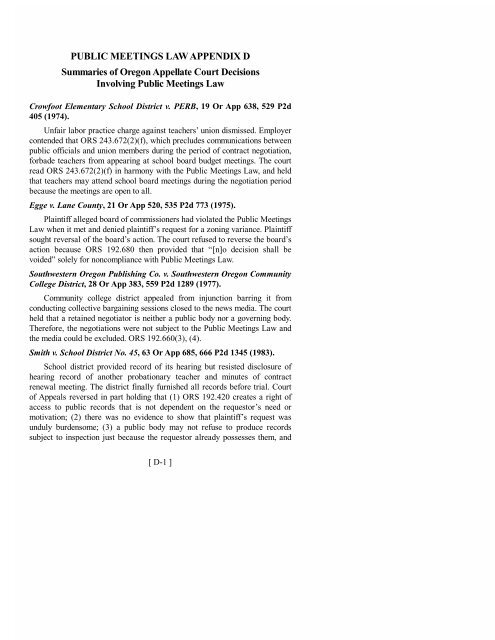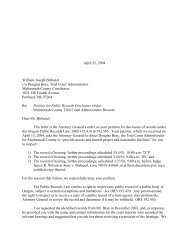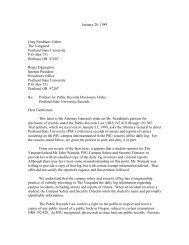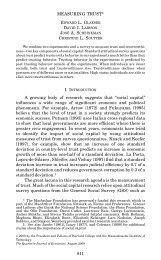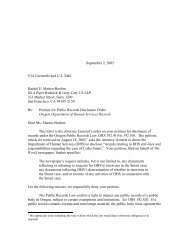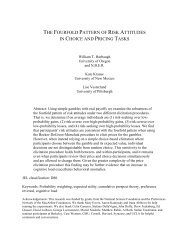PUBLIC MEETINGS LAW APPENDIX D Summaries of Oregon ...
PUBLIC MEETINGS LAW APPENDIX D Summaries of Oregon ...
PUBLIC MEETINGS LAW APPENDIX D Summaries of Oregon ...
Create successful ePaper yourself
Turn your PDF publications into a flip-book with our unique Google optimized e-Paper software.
<strong>PUBLIC</strong> <strong>MEETINGS</strong> <strong>LAW</strong> <strong>APPENDIX</strong> D<strong>Summaries</strong> <strong>of</strong> <strong>Oregon</strong> Appellate Court DecisionsInvolving Public Meetings LawCrowfoot Elementary School District v. PERB, 19 Or App 638, 529 P2d405 (1974).Unfair labor practice charge against teachers’ union dismissed. Employercontended that ORS 243.672(2)(f), which precludes communications betweenpublic <strong>of</strong>ficials and union members during the period <strong>of</strong> contract negotiation,forbade teachers from appearing at school board budget meetings. The courtread ORS 243.672(2)(f) in harmony with the Public Meetings Law, and heldthat teachers may attend school board meetings during the negotiation periodbecause the meetings are open to all.Egge v. Lane County, 21 Or App 520, 535 P2d 773 (1975).Plaintiff alleged board <strong>of</strong> commissioners had violated the Public MeetingsLaw when it met and denied plaintiff’s request for a zoning variance. Plaintiffsought reversal <strong>of</strong> the board’s action. The court refused to reverse the board’saction because ORS 192.680 then provided that “[n]o decision shall bevoided” solely for noncompliance with Public Meetings Law.Southwestern <strong>Oregon</strong> Publishing Co. v. Southwestern <strong>Oregon</strong> CommunityCollege District, 28 Or App 383, 559 P2d 1289 (1977).Community college district appealed from injunction barring it fromconducting collective bargaining sessions closed to the news media. The courtheld that a retained negotiator is neither a public body nor a governing body.Therefore, the negotiations were not subject to the Public Meetings Law andthe media could be excluded. ORS 192.660(3), (4).Smith v. School District No. 45, 63 Or App 685, 666 P2d 1345 (1983).School district provided record <strong>of</strong> its hearing but resisted disclosure <strong>of</strong>hearing record <strong>of</strong> another probationary teacher and minutes <strong>of</strong> contractrenewal meeting. The district finally furnished all records before trial. Court<strong>of</strong> Appeals reversed in part holding that (1) ORS 192.420 creates a right <strong>of</strong>access to public records that is not dependent on the requestor’s need ormotivation; (2) there was no evidence to show that plaintiff’s request wasunduly burdensome; (3) a public body may not refuse to produce recordssubject to inspection just because the requestor already possesses them, and[ D-1 ]
D-2 <strong>PUBLIC</strong> <strong>MEETINGS</strong>the trial court could not properly refuse to declare that the records were publicand subject to disclosure; (4) the statutory litigation exemption is limited; (5)ORS 192.490(3) requires the award <strong>of</strong> attorneys fees so long as a statutoryproceeding was brought and the plaintiff prevails with respect to his or herclaim; and (6) the trial court’s refusal to award attorney fees for violation <strong>of</strong>the Public Meetings Law was discretionary and the court’s refusal was not anabuse <strong>of</strong> discretion.Barker v. City <strong>of</strong> Portland, 67 Or App 23, 676 P2d 1391 (1984).Portland City Council convened in executive session to conductdeliberations with persons designated by the council to negotiate with cityunions, including the Portland Police Association. Plaintiff, editor <strong>of</strong> anewspaper published on behalf <strong>of</strong> the Association <strong>of</strong> the <strong>Oregon</strong> Council <strong>of</strong>Police Associations, was excluded from the meeting while otherrepresentatives <strong>of</strong> news media were allowed to attend. Plaintiff argued that apublic body is not authorized to selectively exclude representatives <strong>of</strong> thenews media from executive sessions held to discuss labor relations matters.Court held that members <strong>of</strong> news media are statutorily denied right to attendexecutive sessions held for the purpose <strong>of</strong> discussing labor negotiations (ORS192.660(1)(d)). Therefore, the council’s decision to exclude plaintiff and notother representatives <strong>of</strong> the news media was “purely a matter <strong>of</strong> discretionand is not governed by the [Public Meetings] act.”Gilmore v. Board <strong>of</strong> Psychologist Examiners, 81 Or App 321, 725 P2d400, rev den, 302 Or 460, 730 P2d 1250 (1986).Psychologist petitioned for review <strong>of</strong> revocation <strong>of</strong> her license. Shealleged that the revocation was invalid because the board’s public meetingsminutes, kept in accordance with the Public Meetings Law, ORS 192.650(1),showed no record that a vote was taken on the revocation. Petitioner did notcontend that the failure to record a vote resulted in or was caused by any“manipulation <strong>of</strong> the rule <strong>of</strong> the members against petitioner.” The court upheldthe revocation, finding that absent “a showing <strong>of</strong> prejudice, petitioner has notrebutted the presumption that public <strong>of</strong>ficers perform their duties lawfully.ORS 40.135(1)(j). The absence <strong>of</strong> a recorded vote alone is not reversibleerror.”
<strong>PUBLIC</strong> <strong>MEETINGS</strong> D-3South Benton Ed. Assn. v. Monroe Union High, 83 Or App 425, 732 P2d58, rev den, 303 Or 331, 736 P2d 565 (1987).The school district sought review <strong>of</strong> an unfair labor practice order, issuedbecause the district had refused to sign an agreement reached throughcollective bargaining with the association. The court had to consider thePublic Meetings Law in conjunction with the Public Employes CollectiveBargaining Act, ORS 243.650 to 243.782, and other statutes governing schooldistrict contracting. The Public Meetings Law allowed the district to conduct,in executive session, “deliberations with persons designated by the governingbody to carry on labor negotiations,” ORS 192.660(1)(d), but prohibited thedistrict from holding an executive session “for the purpose <strong>of</strong> taking any finalaction or making any final decision,” ORS 192.660(4). The collectivebargaining statutes relating to school districts, ORS 332.057 and 332.255,appeared to require school board approval <strong>of</strong> a collective bargainingagreement before it could be enforced. Finally, ORS 243.672(1)(h) defined asan unfair labor practice a refusal to sign an agreement previously reached bycollective bargaining. Reading these statutes together, the court affirmed theunfair labor practice order, and held that “<strong>of</strong>fers made by a negotiator as aresult <strong>of</strong> executive sessions [are] binding * * *. * * * District can still complywith * * * ORS 192.630 by ratifying the agreement at a public meeting afterproper notice.” ORS 192.630 does not prevent a collective bargaining agreementpreviously reached through negotiations from being enforceable againstthe district, where the negotiations were conducted at an executive sessionmeeting.Barker v. City <strong>of</strong> Portland, 94 Or App 762, 767 P2d 460 (1989).Action by monthly newspaper and its editor seeking ruling that the cityacted in violation <strong>of</strong> the Public Meetings Law, and an order that the citycomply with ORS 192.630 in the future. The Court <strong>of</strong> Appeals held that ORS192.680(1) provides for such relief, even if a public body has ceased itsprevious unlawful practices. A public body’s cessation <strong>of</strong> improper meetingspractices does not render an action under the Public Meetings Law moot,because any illegal action that may have been taken previously is notlegalized by the cessation, but remains illegal.The court also held that the plaintiffs, as representatives <strong>of</strong> the press andas legal entities, alleged sufficient facts to accord them standing under thePublic Meetings Law.
D-4 <strong>PUBLIC</strong> <strong>MEETINGS</strong>Finally, the court held that the circuit court is the appropriate forum tohear actions under the Public Meetings Law, ORS 192.680.Oreg. Assoc. <strong>of</strong> Classified Emp. v. Salem-Keizer, 95 Or App 28, 767 P2d1365, rev den 307 Or 719 (1989).Plaintiff labor association alleged that defendant school district violatedPublic Meetings Law by making decision during unauthorized emergencymeeting. The Court <strong>of</strong> Appeals held that no “actual emergency,” ORS192.640(3), existed as to the matter that was the subject <strong>of</strong> the decision;existence <strong>of</strong> actual emergency as to a different matter did not justify makingdecision on other non-emergency matters without complying with statutorynotice requirements.The court also held that inconvenience <strong>of</strong> the members <strong>of</strong> a governingbody does not constitute an “actual emergency.”Finally, the court held that any remedy granted under the Public MeetingsLaw must focus on the purposes and policies <strong>of</strong> the meetings law.<strong>Oregon</strong>ian Publishing Co. v. Board <strong>of</strong> Parole, 95 Or App 501, 769 P2d795 (1989).ORS 192.690, which exempts the Board <strong>of</strong> Parole’s “deliberations” fromthe Public Meetings Law, does not exempt from the application <strong>of</strong> themeetings law the portions <strong>of</strong> a board meeting when the board is gatheringinformation upon which it will deliberate and decide.Harris v. Nordquist, 96 Or App 19, 771 P2d 637 (1989).Plaintiffs, who alleged that they are residents, employes and taxpayers <strong>of</strong>defendant school district who are vitally interested in the district’s decisionsand the information leading to those decisions, alleged sufficient facts todemonstrate standing to challenge the district’s alleged Public Meetings Lawviolations.Where the evidence showed that the defendant board members did notmeet in secret for the purpose <strong>of</strong> deciding on or deliberating toward a decisionon any matter, and never discussed board business at any <strong>of</strong> their privategatherings, defendants did not violate ORS 192.630(2).The court also held that, under ORS 192.695, the burden <strong>of</strong> pro<strong>of</strong> shiftsto defendants only after a plaintiff makes a prima facie case that a quorum <strong>of</strong>a governing body has met in private for the purpose <strong>of</strong> deciding on ordeliberating toward a decision on any matter.
<strong>PUBLIC</strong> <strong>MEETINGS</strong> D-5In addition, the court held that ORS 192.650 does not require minutes <strong>of</strong>prohibited meetings.Finally, the court held that ORS 192.650 requires minutes to be preservedfor a reasonable time after a meeting, and that in this instance, one year was areasonable time.Students for Ethical Treatment v. Inst. Animal Care, 113 Or App 523, 833P2d 337 (1992).Plaintiffs whose goals are to educate the public about animal exploitationhave standing under ORS 192.680(2) to seek declaration that universitycommittee charged with ensuring that animal research meets applicablestandards violated Public Meetings Law because committee decisions, andinformation on which those decisions are made, have potential impact onplaintiffs’ ability to perform that educational role.


